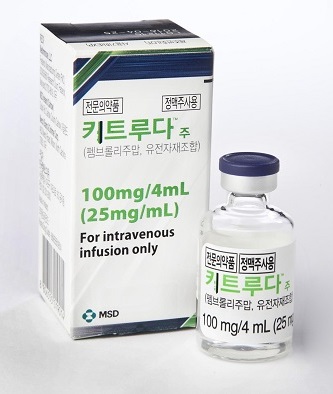MSD Korea said Tuesday that it has received approval from the Ministry of Food and Drug Safety (MFDS) to expand the indication of its anti-PD-1 immuno-oncology drug Keytruda (pembrolizumab) as a combination therapy with chemoradiotherapy for treating patients with FIGO 2014 stage III-IVA cervical cancer.
The approval allows Keytruda to treat patients with high-risk, locally progressive cervical cancer staged III-IVA according to the 2014 International Federation of Gynecology and Obstetrics (FIGO) criteria.

This is Keytruda's second indication for cervical cancer, following the FDA approval in 2022 for PD-L1-positive (CPS≥1) persistent, recurrent, or metastatic cervical cancer, and is intended to be used at an earlier stage than the previous indication.
Cervical cancer has a high prevalence rate, ranking as the fifth most common cancer among women in Korea according to the 2021 National Cancer Registry. It is also the fifth most common cancer among young women aged 15 to 34.
The phase 3 KEYNOTE-A18 study, the basis of the approval, evaluated the effectiveness of Keytruda in combination with chemoradiotherapy (CRT) in 1,060 patients with lymph node-positive FIGO 2014 stage IB2-IIB cervical cancer (462 patients) and lymph node-positive or negative FIGO 2014 stage III-IVA cervical cancer (598 patients) who had not received prior cervical cancer treatment.
The Keytruda-chemoradiotherapy arm demonstrated improved treatment effectiveness compared to the placebo-chemoradiotherapy arm in the primary endpoints of progression-free survival (PFS) and overall survival (OS).
The 24-month progression-free survival rate for the Keytruda-chemoradiotherapy combination was 68 percent vs. 57 percent in the placebo arm, with Keytruda reducing the risk of disease progression and death by 30 percent compared to placebo. In the 24-month overall survival analysis, Keytruda reduced the risk of death by 27 percent compared to placebo, with 87 percent in the Keytruda arm and 81 percent in the placebo arm. The most common treatment-related adverse events in the Keytruda arm were anemia (59 percent), nausea (57 percent), and diarrhea (50 percent).
The approval was granted in patients with FIGO 2014 stage III-IVA cervical cancer. While significant PFS improvements were achieved in the overall patient population, the improvements were greater in the authorized population.
In the FIGO 2014 stage III-IVA patient subanalysis, 12-month PFS was 81 percent in the Keytruda-chemoradiotherapy arm and 70 percent in the placebo arm, resulting in a 41 percent reduction in the risk of disease progression and death compared to placebo.
"We are excited to offer a new treatment option for patients with locally advanced cervical cancer who have been treated with chemoradiotherapy as standard of care," said Lee Min-hee, executive vice president of MSD Korea's Anti-Cancer Business Division. "This approval is the second indication for Keytruda in cervical cancer and the first indication for treating early-stage women's cancers, following high-risk early triple-negative breast cancer."
Professor Kim Yong-man of the Department of Obstetrics and Gynecology at Asan Medical Center said, "Cervical cancer is a high-risk disease in young women, with about 40 percent of locally progressive patients experiencing recurrence after treatment. More than three-quarters of recurrences occur within two to three years of initial treatment, and the lack of treatment options to reduce recurrence rates has been an unmet need.”
However, with the clear efficacy of Keytruda in patients with stage III-IVA cervical cancer at FIGO 2014, medical professionals expect to revolutionize the early treatment of cervical cancer following approval, Professor Kim added.
Related articles
- Keytruda approved as 1st-line treatment for HER2-negative gastric cancer to vie with Opdivo
- GSK's Jemperli beats MSD's Keytruda to become 1st-line treatment for endometrial cancer in Korea
- Concern became a reality as Keytruda’s coverage expansion stalls
- Keytruda’s coverage expansion effectively ‘shelved’
- Why Keytruda is essential for treating early-stage triple-negative breast cancer
- Keytruda’s approval for locally advanced cervical cancer gives green light for early treatment
- Keytruda wins nod as postoperative adjuvant therapy for early-stage NSCLC

